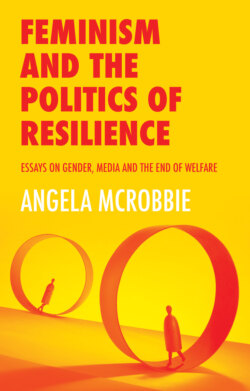Feminism and the Politics of 'Resilience'

Реклама. ООО «ЛитРес», ИНН: 7719571260.
Оглавление
Angela McRobbie. Feminism and the Politics of 'Resilience'
Contents
Guide
Pages
Feminism and the Politics of Resilience. Essays on Gender, Media and the End of Welfare
Copyright page
Acknowledgements
Introduction
Notes
1 Feminism, the Family and the New Multi-Mediated Maternalism. The Maternal–Feminine
Revolutionary Road?
The Nursery as Socialist Ideal
Good Housekeeping: The Biopolitics of the Family
Visual-Media Governmentality, Maternity and ‘Neoliberal Feminism’
Notes
2 Feminism and the Politics of Resilience. The Profit from Feminism?
Competitive Femininity
The Politics of Resilience
Red and Resilience
Critique of Resilience
‘The Violence of Regulatory Norms’ (Butler 1997)
Conclusions
Notes
3 Out of Welfare: Women and ‘Contraceptive Employment’
‘Sleeping off a Life on Benefits’16
Feminism and New Public Management
Gender and Anti-Welfarism
Notes
4 ‘Breaking the Spell of the Welfare State’:1 Gender, Media and Poverty-Shaming
Reality TV as Social Worker?
Little Britain
Abjection
White Dee
Black Women, ‘Welfare Queens’ and Anti-Welfare Media
Some Brief Conclusions
Notes
References
Index
POLITY END USER LICENSE AGREEMENT
Отрывок из книги
Angela McRobbie
As ever, I am indebted to Goldsmiths, University of London, and my colleagues in the Department of Media, Communications and Cultural Studies for their enthusiasm and good cheer. I was also able to complete the manuscript thanks to a period of sabbatical leave in 2018. Thanks also to the team at Polity Press for their friendly professionalism and patience.
.....
With this high visibility of feminism I also draw attention to the argument of Boltanski and Chiapello, who examine the ways in which capitalism has revitalized itself by absorbing elements of the anti-capitalist movements of the late 1960s (social critique or artistic critique) on the basis of their potential for innovation (Boltanski and Chiapello 2005). This leads me to propose that new feminist research projects might look closely, with ethnographic detail, at the cultural producers, including the gatekeeper, editors and other decision-makers; in particular those people who are charged with this task of translation.
The second issue I reflect on connects with the perceived harms to women of competition and endless self-assessment. Here I draw attention to the politics of resilience, which in turn entails a scaling down of the principles of neoliberal ‘leadership-feminism’ in favour of a more ordinary and less exceptional set of expectations. Liberal feminism proves itself to be more accommodating to the management of self for the modern-day middle-class gender regime. With such an emphasis on the widespread mental ill health of the female subject I also query the absence of a feminist psycho-analytical vocabulary, which would interrogate the basis of this female complaint and the prevalence of self-beratement. The writing of Adam Phillips and also Judith Butler permits a pathway away from the tyranny of the sovereign self in favour of a more relational and dependent idea of the subject who asks, from the start: ‘Who are you?’
.....